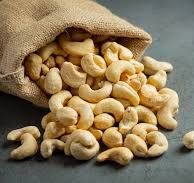Cashew (Anacardium Occidentale L.) is a tree crop of considerable economic importance to Nigeria and other tropical countries. Apart from being a source of useful products and byproducts for food, medicinal and industrial applications, cashew gives also a useful shade, while ornamental and alley trees are suitable for the control of soil erosion, particularly for the protection of watersheds and dams.
Cultivation of cashew started in the early 1950s, through the efforts of the then Eastern Nigeria Agricultural Development. The initial objective of the program was to use cashew trees for erosion control, because of the massive erosion problems in that part of the country. The realization of cashew nut as a potential revenue-earning commodity compelled the defunct Eastern and Western Nigeria Governments to start commercial plantations in most towns of these regions.
Major cashew growing areas in Nigeria are, by order of importance: Enugu, Abia, Imo, Anambra, Ebonyi and Cross River States in the eastern part of the country; Oyo, Osun, Ondo, Ekiti and Ogun States in the Western part, as well as Kwara, Kogi, Nassarawa, Benue, Taraba, Niger and FCT in the Middle Belt and also Sokoto and Kebbi States in the North West part of the country. The majority of export quality nuts come from the Western and Eastern parts of the country.
Cashew nut setting begins in the middle of dry season, while harvesting takes place mainly in February or March. The entire harvest period occupies about 16 weeks. In the Eastern and Western parts of the country, where quality cashew nuts are grown, nuts are allowed to drop to the ground before they are collected. This practice ensures that only ripe nuts are collected.
Nuts normally fall to the ground with their apples attached; the two are normally separated with at twisting action during collection. The remnants of the apple flash adhering to the nuts are removed with a sharp knife.
After picking, the nuts are dried in the sun for 2 to 3 days, to reduce their moisture content to about 12 %. Properly dried nuts are packed in jute bags and can be kept for 6 to 10 months, if stored in suitable condition.
The SWOT analysis showed that the opportunities of the business outweigh the challenges and was concluded that cashew nut export idea is healthy and feasible in Nigeria.
Cultivation of cashew started in the early 1950s, through the efforts of the then Eastern Nigeria Agricultural Development. The initial objective of the program was to use cashew trees for erosion control, because of the massive erosion problems in that part of the country. The realization of cashew nut as a potential revenue-earning commodity compelled the defunct Eastern and Western Nigeria Governments to start commercial plantations in most towns of these regions.
Major cashew growing areas in Nigeria are, by order of importance: Enugu, Abia, Imo, Anambra, Ebonyi and Cross River States in the eastern part of the country; Oyo, Osun, Ondo, Ekiti and Ogun States in the Western part, as well as Kwara, Kogi, Nassarawa, Benue, Taraba, Niger and FCT in the Middle Belt and also Sokoto and Kebbi States in the North West part of the country. The majority of export quality nuts come from the Western and Eastern parts of the country.
Cashew nut setting begins in the middle of dry season, while harvesting takes place mainly in February or March. The entire harvest period occupies about 16 weeks. In the Eastern and Western parts of the country, where quality cashew nuts are grown, nuts are allowed to drop to the ground before they are collected. This practice ensures that only ripe nuts are collected.
Nuts normally fall to the ground with their apples attached; the two are normally separated with at twisting action during collection. The remnants of the apple flash adhering to the nuts are removed with a sharp knife.
After picking, the nuts are dried in the sun for 2 to 3 days, to reduce their moisture content to about 12 %. Properly dried nuts are packed in jute bags and can be kept for 6 to 10 months, if stored in suitable condition.
The SWOT analysis showed that the opportunities of the business outweigh the challenges and was concluded that cashew nut export idea is healthy and feasible in Nigeria.
1.0 Project Brief
1.1 Proposed Business Legal Status
1.2 Opportunity Rationale
2.0 Markets
2.1 Market Information
2.2 Pricing
3.0 Cashew Nut Export Specification
4.0 Export Documentation
4.1 Pre-Export Documentations in Nigeria
4.2 Post-Export Documentations (Exchange Control Documents)
5.0 Pre-Operating Activities and Expenses
6.0 INCOTERMS in International Trade
7.0 Securing an Export Contract
8.0 Critical Success Factors of the Business
8.1 SWOT Analysis
9.0 Risk
10.0 Cost & Profitability Analysis
1.1 Proposed Business Legal Status
1.2 Opportunity Rationale
2.0 Markets
2.1 Market Information
2.2 Pricing
3.0 Cashew Nut Export Specification
4.0 Export Documentation
4.1 Pre-Export Documentations in Nigeria
4.2 Post-Export Documentations (Exchange Control Documents)
5.0 Pre-Operating Activities and Expenses
6.0 INCOTERMS in International Trade
7.0 Securing an Export Contract
8.0 Critical Success Factors of the Business
8.1 SWOT Analysis
9.0 Risk
10.0 Cost & Profitability Analysis
$60 (N80,000)
reach us for Trade Finance Offer : admin@fundxperts.com
Contact us : admin@fundxperts.com

